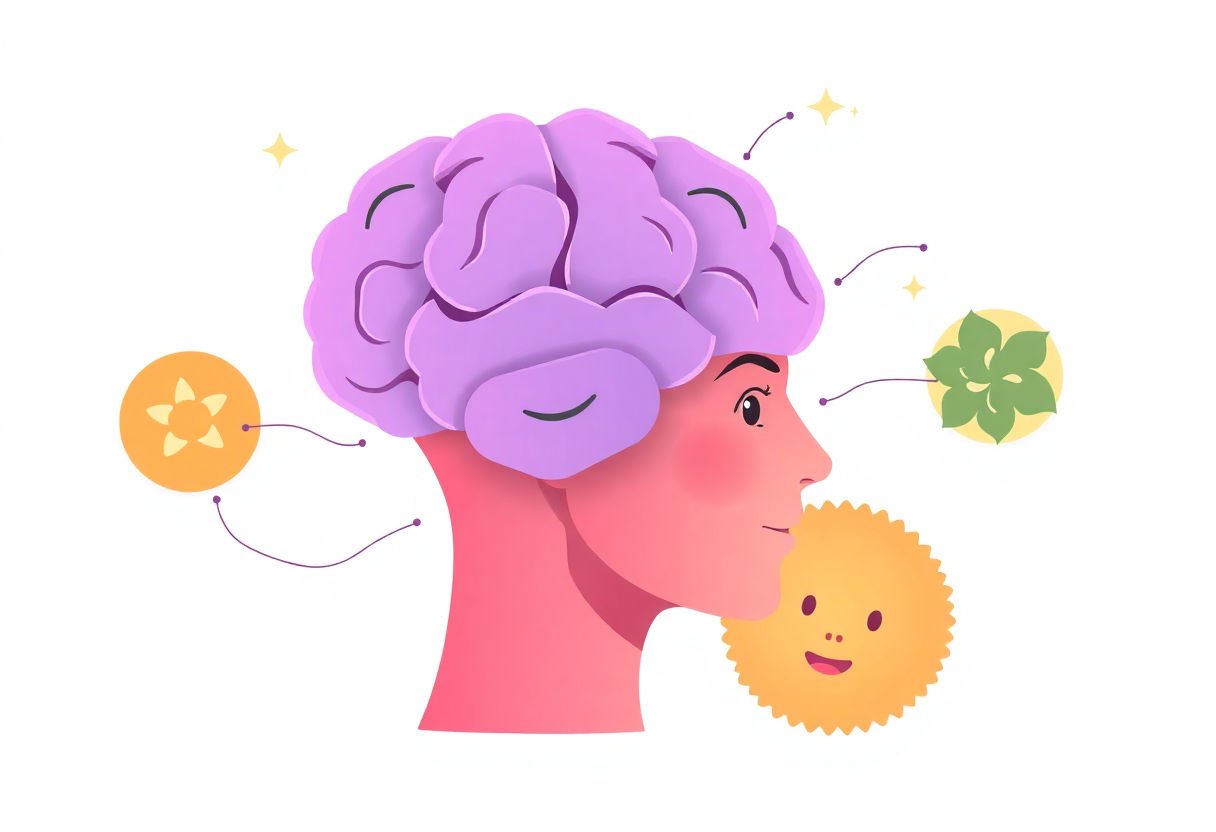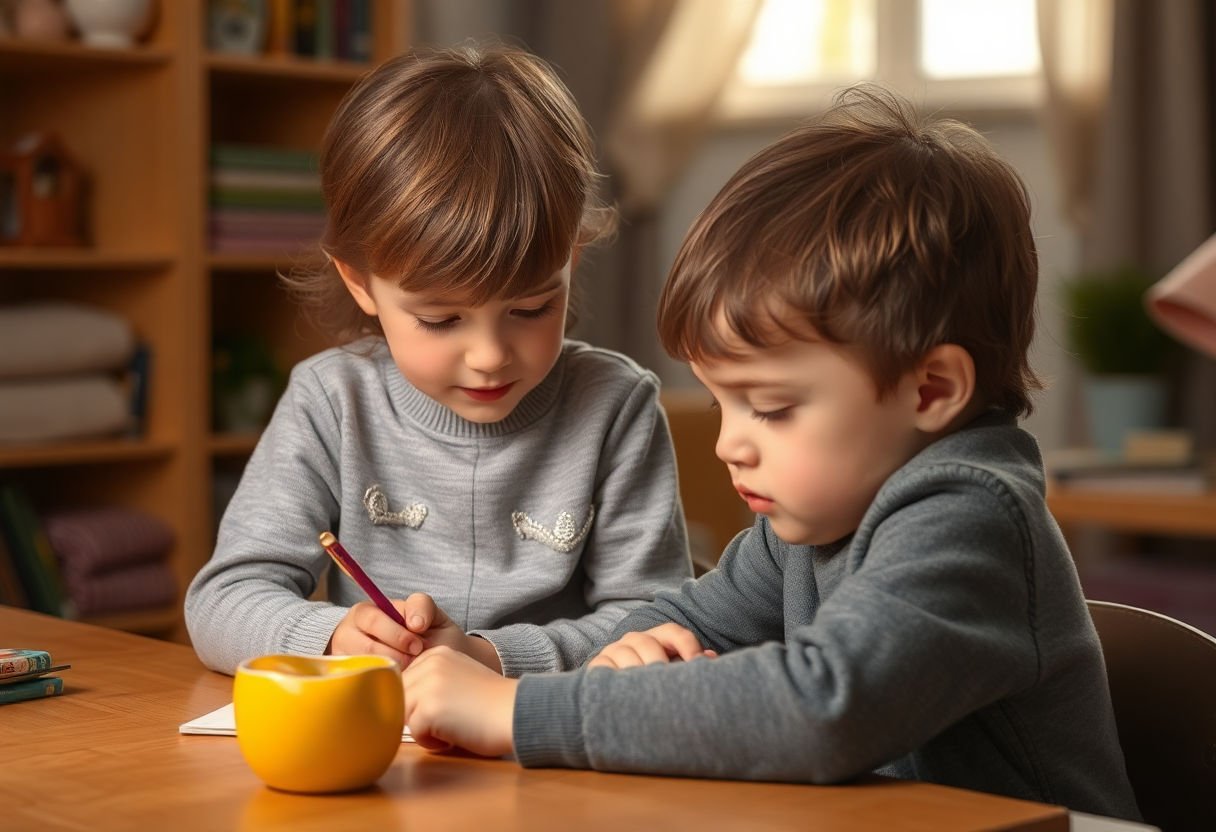Children often experience a whirlwind of emotions. Understanding these feelings is important. Emotional intelligence helps children grow and form bonds. They learn to see the world through the eyes of others. Parents play a key role in this journey. They help children recognize emotions like joy, sadness, and anger. Teaching empathy can lead to a more caring world. Simple games and activities make this learning fun. Kids can use these skills to solve problems and succeed in school. Emotional intelligence is not just for feeling better. It’s about creating a bright future.
Key Takeaways
- Emotional intelligence helps children connect their feelings with their actions, boosting their growth.
- Parents play a key role in fostering awareness and understanding emotions in kids.
- Teaching kids about emotions includes helping them identify, express, and manage their feelings.
- Developing empathy in children builds their ability to understand others and improve social interactions.
- Emotional intelligence enhances children’s conflict resolution skills and academic success through better focus and understanding.
What is Emotional Intelligence?

Emotional intelligence, or EQ, means understanding and handling feelings. It is not just about knowing those feelings but also how to express them. Kids learn to recognize what different emotions feel like. They start to manage these feelings, even the tough ones like anger and sadness.
EQ is like a special tool. It helps children in many ways. They become better at making friends. They solve problems more easily. They don’t just react in anger but think and respond in a better way.
Think of EQ like learning to ride a bike. At first, it feels tricky. With practice, pedaling, steering, and balancing become second nature. The same goes for understanding emotions. With time, children learn to ride their feelings smoothly.
Why is EQ important?
-
Social Skills: EQ helps children play well with other kids. They learn to take turns and share. These skills are important for teamwork.
-
Self-Awareness: Kids become aware of their own feelings. They understand why they feel a certain way.
-
Emotion Regulation: Children gain the ability to calm down when upset. They learn ways to handle stress or frustration.
-
Motivation: Kids with high EQ often show more persistence. They handle setbacks without giving up.
So, emotional intelligence means being smart with feelings. It teaches kids to listen to their heart and those of others. This way, they can grow into kind and understanding adults.
The Role of Parents in Developing Emotional Intelligence

Parents play a big role in helping kids understand their feelings. Kids learn by watching. When parents show how to handle feelings, kids copy. Imagine a parent reacting calmly to a bad situation. The child sees this and learns calmness.
Talk is key. Spend time each day to ask kids about their feelings. This teaches them words to express themselves. “Happy,” “sad,” or “angry” become part of their talks. Use empathy. It’s like wearing another person’s shoes. Show kids how to see things from others’ points of view.
Create a safe space for kids to show emotions. It’s okay to cry, laugh, or feel upset. Let them know this. When a child feels safe to express, they learn that emotions are normal.
Use examples from books and stories. Ask how a character might feel. This way, kids connect with emotions they might not understand yet.
When conflicts come up, guide them. Ask, “How do you think they feel?” or “What can we do to fix this?” These questions build emotional thinking.
Teach them to name feelings. Use charts or drawings. Happy faces and sad faces work wonders for younger children.
In simple terms, parents shape their child’s emotional world. They provide tools and support. Show love and patience. Each day adds a brick to a strong emotional foundation.
Teaching Children About Emotions

Teaching children about emotions can be fun and rewarding. Kids need to learn how to name and express what they feel. Start by using simple words for emotions. Happy, sad, angry, and excited are good starting points. You can show them pictures of faces and ask, “How do they feel?” This helps children connect words with expressions.
Reading stories with emotion helps too. Pick books where characters feel different things. As you read, ask, “How does this character feel?” Talk about why the character feels that way. This helps children see emotions in others.
Role-playing games work well. You can act out scenes where someone feels something, like losing a toy. Ask your child to show what someone would do if they felt sad. This builds empathy.
Use “I” statements to model expressing feelings. Say, “I feel happy when we play together” or “I feel upset when it’s noisy.” This teaches them how to talk about their own feelings.
Sometimes children do not know how to express what they feel. Offer them choices. For example, if they seem upset, say, “Do you feel angry or tired?” It helps them pick the right words.
Teach that all feelings are okay, but not all actions. It is okay to feel angry, but not okay to hit. Show them other ways to manage their emotions, like taking deep breaths or counting to ten.
By practicing these tips, you help children understand and share their emotions better. This helps them feel safe and supported.
Developing Empathy in Children

Empathy helps kids understand others’ feelings. To build empathy, adults can use stories. When kids read about characters, they see different perspectives. This helps them relate to others. Role-playing is another great method. By acting out scenarios, kids step into others’ shoes. They learn what it feels like to be in different situations.
Parents and teachers can also point out feelings in everyday situations. When watching TV or reading a book, ask questions like, “How do you think he feels?” This encourages kids to think about emotions and reactions.
Listening is key. Teach kids to listen without interrupting. When they listen, they learn to understand and sympathize with others. Encourage them to ask questions. This shows interest in how others feel and think.
Kids should reflect on their own feelings too. Help them identify their emotions. Ask, “What makes you happy?” or “Why did that upset you?” Understanding themselves helps them relate to others better.
Volunteer activities can boost empathy. When kids help others, they see struggles different from their own. This opens their eyes to different challenges people face.
Praise kids when they show empathy. Acknowledge acts of kindness. This reinforces the value of empathy and motivates future kind actions.
With these simple methods, empathy can grow in children, helping create a kinder, more understanding world.
Utilizing Emotional Intelligence in Conflict Resolution
Children can use emotional intelligence to solve conflicts in peaceful ways. When kids know emotions, they cope with challenges better. Let’s explore how they apply it when disagreements arise.
Listening with Understanding: When children face a conflict, they need to listen to what the other person says. It is important to pay attention not only to words but also to feelings. For example, if two kids both want to play with the same toy, one might say they had the toy first. The other might feel upset and insist it was their turn. Listening helps show why each child feels this way.
Expressing Feelings Clearly: Kids must say how they feel in a calm manner. This helps the other person understand their side. Instead of shouting, they could say, “I feel sad when I cannot play with my favorite toy.” This approach lessens anger and helps the other child understand them better.
Finding a Solution Together: Encourage children to find a way to solve the conflict that makes both happy. This can be as simple as taking turns. If one child holds a toy for five minutes, the other waits patiently, knowing their turn is next. Working together helps them both feel heard.
Practicing Patience: Conflicts don’t go away immediately. Kids need patience to discuss and solve disagreements. Like how water smooths a rough stone over time, patience makes conflicts easier to manage.
By applying emotional intelligence, children learn to manage conflicts better. These skills help them handle challenges both in childhood and beyond.
The Connection Between Emotional Intelligence and Academic Success
Children with strong emotional intelligence do well in school. Such skills help them in many ways. When children manage their emotions, they handle stress better. Imagine a child who gets nervous before a test but uses deep breaths to calm down. This quiet time allows focus and clear thinking.
Self-awareness is another key part. Kids who know their feelings understand their strengths and weaknesses. For instance, a child who realizes math is difficult may ask for extra help. This shows maturity and a will to improve.
Empathy plays a big role too. When children understand what others feel, they make friends easily. This connection creates a supportive school life. Studies show kids with good friends tend to get better grades.
Teachers notice emotionally intelligent children and often see them as leaders. These children listen well, solve problems and work well with classmates. This leadership boosts their confidence and makes learning more enjoyable.
Here is a simple comparison:
| Emotional Skill | School Example |
|---|---|
| Managing Emotions | Staying calm during a test |
| Self-awareness | Knowing when to ask for help |
| Empathy | Understanding a friend’s sadness |
| Leadership | Leading group projects |
These skills highlight how emotional intelligence matters in school success. They prepare children not just for tests but for life.
Games and Activities to Boost Emotional Intelligence
Games can teach children about their feelings. They help kids understand and deal with emotions in a fun way. Here are some activities that parents and children can enjoy together:
-
Emotion Charades: Like regular charades, but with feelings. Choose a card with an emotion written on it. Act out the feeling using facial expressions and body language. This helps kids learn to recognize and express emotions.
-
Feelings Bingo: Create bingo cards with different emotions. Each time a player sees or feels an emotion during the day, mark it on the card. The first one to get a bingo wins. This game builds emotional awareness.
-
The Blob Game: Pretend to be blobs of different emotions. Move around the room like a happy blob or a sad blob. This helps children understand how emotions can change the way we act and move.
-
Story Time with a Twist: Read stories together. After each story, talk about the characters’ feelings. Ask questions like, “How did the character feel?” and “Why did they feel that way?” This develops empathy and understanding.
-
Feelings Jar: Decorate a jar and fill it with paper slips. Each slip has a different emotion written on it. At the end of each day, everyone picks a slip and shares a time they felt that emotion.
Games make learning about feelings fun and natural. Through play, kids learn to name, understand, and manage their emotions better. This helps in social situations and builds strong emotional skills for life.
Challenges and Misconceptions in Teaching Emotional Intelligence

Teaching emotional intelligence often comes with hurdles and myths. Many people think of emotions like a puzzle, hard to understand. This can make it hard to teach kids about feelings.
One common challenge involves a belief that kids should not show emotions. People sometimes say things like, “Boys don’t cry,” which teaches kids to hide their feelings. Suppressing emotions can confuse kids. They need to feel safe to share their feelings.
Another misconception is thinking emotional intelligence is the same as being “nice” all the time. Teaching kids to be in tune with their emotions does not mean letting others take advantage of them. Instead, it means understanding feelings—both their own and others’.
Some teachers and parents might believe teaching emotional intelligence takes too much time. But this is like learning to ride a bike; practice makes it easier and more natural as time goes on.
Adults sometimes think emotions are too big or messy to handle. Kids can learn to manage feelings with careful guidance and time. Simple activities like role-playing can help kids learn empathy. Acting out scenarios lets kids practice understanding others’ feelings.
Teaching emotional intelligence does not happen overnight. It needs patience and consistency. With the right approach, children can learn to navigate their feelings and develop strong emotional intelligence. They will become more resilient, kind, and understanding individuals.
Conclusion
Cultivating emotional intelligence in children sets the foundation for their future success and well-being. This skill goes beyond academics; it prepares them for a life of understanding and empathy. The ability to navigate emotions and relationships shapes their personal and professional lives. Parents and educators should encourage these skills. Simple activities and games help build emotional intelligence, making it a fun and rewarding journey for children. Encourage open conversations and teach them to recognize their feelings. With continuous support, children will grow into empathetic and resilient adults, ready to face the world.
Frequently Asked Questions
What is emotional intelligence in children?
Emotional intelligence in children means they can understand and manage their feelings. It helps them form good relationships and deal with challenges. Kids with high emotional intelligence often show better behavior and perform well in school.
How can parents help develop their child’s emotional intelligence?
Parents can talk about feelings openly with their children. Encourage them to express how they feel. Use books or stories to discuss different emotions and teach ways to handle them.
At what age can children start learning about emotional intelligence?
Children can begin learning about emotions as early as preschool age. They start recognizing basic feelings like happiness or sadness. Simple games and activities can support this learning process.
Why is empathy important for children?
Empathy allows children to understand how others feel. It helps them respond kindly and make strong friendships. Teaching empathy aids in reducing bullying and building a caring community.
Does emotional intelligence affect a child’s school performance?
Yes, emotional intelligence can influence learning. Kids who manage their emotions well often do better in school. They can focus more and work well with others, which supports academic success.

